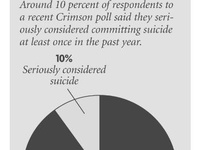But University General Counsel Robert W. Iuliano ’83 says that no law prevents Harvard from urging mentally ill students who are not doing well to leave.
“There’s nothing in the law that prohibits an educational institution from encouraging any student to take a leave of absence,” he writes. “In many instances this may be exactly the right piece of advice for a student who for whatever reason is not effectively participating in the academic and extracurricular activities of the school.”
The Shin Case
In less than one year, one court case—Shin v. MIT—may redefine universities’ liability in cases of students with mental health problems.
In 2000, MIT undergraduate Elizabeth Shin fatally set herself on fire after spending a year in treatment with campus mental health clinicians.
Her parents are suing MIT in Massachusetts Superior Court for breach of contract, medical malpractice and negligence, claiming that MIT did not provide Shin with adequate, coordinated mental health care, and that the school should have informed them when Shin had threatened and attempted to commit suicide before.
Lake says the case the Shin case holds “major national significance” for universities’ legal responsibilities for mentally ill students.
“Everybody is watching this case—it’s an incident that’s leading to a revolution,” Lake says. “We all expect this case to be the kind of litigation with long-term significance.”
David A. Deluca, the attorney who represents Shin’s parents, says that the confidentiality rule that prevented MIT from telling the Shins about their daughter’s problems is one policy that may be reinterpreted by this case’s decision. “You can’t hide behind the wrongly-held belief that anything having to do with the health care of a student is going to be privileged and not communicated,” Deluca says. “There’s a huge exception to that—when the [it] reaches an emergency situation, that goes out the window.”
Currently privacy laws like the 1974 Family Educational Rights and Privacy Act bar schools from releasing most information to parents about a student—from grades to medical information—without the student’s permission.
The rule provides for confidentiality to be broken only when the student is in imminent danger, but this categorization can be hazy.
Lake says that the case has garnered so much attention because higher education institutions have long been been able to avoid legal responsibility for student health.
“Higher education for decades was basically immune from most legal responsibility,” Lake says. “That has changed, but the mentality is still there, that you don’t change until the court tells you to.”
Deluca says that universities have a legal obligation to “move aggressively to intervene” if administrators discover a student is suicidal.
Universities are not just watching and waiting until the decision is handed down. Lately, many schools—including Harvard—have begun examining their mental health care systems.
Read more in News
Chapel May Remain in Cambridge Permanently















